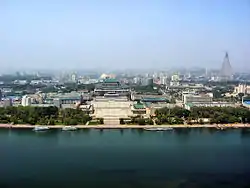Chung-guyok
Chung-guyok (Central Ward) is one of the 19 guyok which constitute the city of Pyongyang, North Korea. The district is located in the center of the city, between the Pothonggang Canal and Taedong River, and is bordered to the north by Moranbong-guyok, to the northwest by Potonggang-guyok, and to the south by Pyongchon-guyok.
Chung-guyok | |
|---|---|
Guyok of Pyongyang | |
| Korean transcription(s) | |
| • Hangul | 중구역 |
| • Hanja | 中區域 |
| • Revised Romanization | Jung-guyeok |
| • McCune–Reischauer | Chung-guyŏk |
 | |
| Coordinates: 39°00′00″N 125°44′24″E | |
| Country | North Korea |
| Direct-administered city | P'yŏngyang-Chikhalsi |
| Administrative divisions | 19 administrative dong |
| Area | |
| • Total | 13.1 km2 (5.1 sq mi) |
| Population (2008)[1] | |
| • Total | 131,333 |
| • Density | 10,000/km2 (26,000/sq mi) |
Overview
As the centre of Pyongyang, the district holds many of the city's most important buildings. The famous Kim Il-sung Square is located along the banks of the Taedong river, together with the Grand People's Study House, which is the national library of North Korea.[2] Chung-guyok was once the historical centre of Pyongyang, and was almost completely obliterated during the Korean War by American bombing. Vestiges of the old city can still be seen, and the district is home to several of North Korea's National Treasures, including the rebuilt Potong and Taedong Gates, the Pyongyang Bell, the Ryongwang Pavilion, and the Sungryong and Sungin Halls.[3] Other buildings include the Koryo Hotel, Taedonggang Hotel, Pyongyang First Department Store, the Korea Stamp Museum, the Pyongyang Central Children's palace and Taedongmoon Cinema.
The Pyongyang Metro runs through this district, with stops at Yonggwang, Ponghwa and Sungri stations. Pyongyang's central railway station is also located here.
Executive offices of the North Korean government and its industry are located in the area. The headquarters of the Workers' Party of Korea and the headquarters of the Central Committee of the Workers' Party of Korea are located in the area.
Many new riverside terraced apartments were built along the Pothonggang Canal, a project which Kim Jong-un visited multiple times,[4] and the district was renamed by the 690th order of the Presidium of the SPA.[5]
Administrative divisions
Chung-guyok is divided into nineteen administrative districts known as dong.[7]
| Chosŏn'gŭl | Hancha | |
|---|---|---|
| Ch'anggwang-dong | 창광동 | 蒼光洞 |
| Chongro-dong | 종로동 | 鍾路洞 |
| Chungsŏng-dong | 중성동 | 中城洞 |
| Haebangsan-dong | 해방산동 | 解放山洞 |
| Kyogu-dong | 교구동 | 橋口洞 |
| Kyŏngrim-dong | 경림동 | 敬臨洞 |
| Kyongru-dong[8] | 경루동[5] | 瓊樓洞[9] |
| Kyŏngsang-dong | 경상동 | 慶上洞 |
| Mansu-dong | 만수동 | 萬壽洞 |
| Oesŏng-dong | 외성동 | 外城洞 |
| Ot'an-dong | 오탄동 | 烏灘洞 |
| Pot'ongmun-dong | 보통문동 | 普通門洞 |
| Ryŏnhwa-dong | 련화동 | 蓮花洞 |
| Ryusŏng-dong | 류성동 | 柳城洞 |
| Sŏch'ang-dong | 서창동 | 西蒼洞 |
| Sŏmun-dong | 서문동 | 西門洞 |
| Taedongmun-dong | 대동문동 | 大同門洞 |
| Tong'an-dong | 동안동 | 東岸洞 |
| Tonghŭng-dong | 동흥동 | 東興洞 |
| Tongsŏng-dong | 동성동 | 東城洞 |
| Yŏkchŏn-dong | 역전동 | 驛前洞 |
References
- North Korea: Administrative Division. citypopulation.de.
- The Grand People's Study House of the DPR of Korea. UN System Depository Libraries. Retrieved on August 31, 2008.
- 북한문화재 자료관. Archived from the original on 2008-12-03. Retrieved 2009-05-25.
- "North Korea upgrades new skyscraper to 80 floors, making it 2nd-tallest in DPRK | NK News". NK News - North Korea News. 2021-08-27. Retrieved 2021-09-10
- "로동신문". 로동신문 (in Korean). Retrieved 2021-09-12.
- "Contact Archived 2011-06-05 at the Wayback Machine." Air Koryo. Retrieved on August 6, 2009.
- "북한지명사전". 북한지명사전. Archived from the original on 2006-11-04. Retrieved 2009-04-23.
- Rodong Sinmun http://rodong.rep.kp/en/index.php?strPageID=SF01_02_01&newsID=2021-09-12-0002.
{{cite web}}: Missing or empty|title=(help) - "劳动新闻". 劳动新闻 (in Chinese). Retrieved 2021-09-12.
